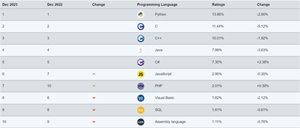News
TIOBE Index Predicts C# as 2023 'Language of the Year' After 2022 Near-Miss
Microsoft's C# programming language led the race to be named "programming language of the year" for 2022 by the TIOBE Index before being overtaken at the very end, but it's expected to attain the throne this year.
"Yes, I know, we have been here before," said Paul Jansen, CEO of TIOBE, this week. "At the end of 2022, it looked like C# would become the programming language of that year. But at the final moment, C++ took the title unexpectedly. This year we are a bit surer that C# is going to win. It gained +2.38 percent in 1 year, whereas its closest contenders Fortran and F# only gained +0.64 percent and +0.48 percent respectively."
Which isn't to say it's a sure thing.
Jansen said pretty much the same thing at about this same time in 2021: "At the moment, C# is by far the most likely candidate for this title."
But his quote the next month was: "C# was on its way to get the title for the first time in history, but Python surpassed C# in the last month." The next year, C++ beat out C#.
The index names the programming language of the year based on biggest annual popularity gain, which is measured in a variety of ways including the number of skilled engineers worldwide and courses and third party vendors for languages, while also enlisting popular search engines for data to calculate the ratings.
C# popularity has been climbing throughout the year, as we reported in October in the article, "
C# Overtaking Java in Popularity Index."
The past five winners were:
- 2022: C++
- 2021: Python
- 2020: Python
- 2019: C
- 2018: Python
For the December 2023 report, here are the top 10 languages:
 [Click on image for larger view.] TIOBE Index December 2023 (source: TIOBE Index).
[Click on image for larger view.] TIOBE Index December 2023 (source: TIOBE Index).
Note that the graphic above shows many of the top languages actually fell in popularity, and Jansen addressed that seemingly "strange" statistic. "The answer lies in the long tail, where all the small languages reside," he said. "Those are all moving up a bit and are getting closer to the big languages. To illustrate this: one year ago the number 50 language had a score of 0.14 percent. The current number 50 language has a score of 0.24 percent. Anyway, we are all curious to see which language will become the programming language of the year!"
TIOBE says its index doesn't seek to name the best programming language or the language in which most lines of code have been written and advises it can be used to check whether a developer's programming skills are still up to date or to help make a strategic decision about what programming language should be used for a new project. The definition of the TIOBE index can be found here.
About the Author
David Ramel is an editor and writer at Converge 360.